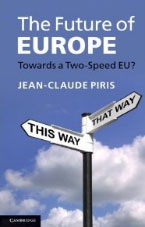Information
Venue
Start
End
The Euro Crisis, Democratic Legitimacy and a Future Two Speed Europe?
Introduction

Prof. Piris argued that these three subjects are linked.
The EU is presently in crisis. With a diminishing support of its public opinion and a weak political legitimacy, it must try to solve the problems of the eurozone, partly caused by unbalanced Treaty provisions, while its institutions are not working properly, due to Treaty rules and procedures inappropriate for an Union of 27 very heterogeneous Members.
The Lisbon Treaty did not solve these problems.
Something has to be done. Solving the euro crisis will oblige the eurozone members to share more budgetary and economic powers with the EU institutions. This is very difficult today, given the insufficient political legitimacy of these institutions. Modifying this would need a substantial revision of the Treaties, to be ratified by the 27 EU members, which looks politically impossible.
The time is therefore approaching when the choice will be between:
- either maintaining the status quo and trying to progress under the present rules, which might or might not be successful, with risks of not being able to solve a renewed acute crisis, or leading to social and political turmoils in some member states, or deriving towards a diluted EU, stagnating and slowly becoming irrelevant both for its members and for the external world,
- or accepting, as a temporary measure, more differentiation between the 27 EU members, allowing an «avant-garde», based on the 17 members of the eurozone, to go ahead on some issues, by adopting specific rules respecting the EU Treaties, but allowing a better democratic legitimacy, an increase of the shared powers and improved efficiency, and then helping later the other EU members to join, when willing and able.
About the Speaker
Professor Jean-Claude Piris, as Legal Counsel of the European Council and of the EU Council of Ministers, participated in all important decisions taken over the past 20 years by the EU, notably the adoption of new Treaties (Maastricht, Amsterdam, Nice, Constitutional Treaty, Lisbon), and the solutions to the problems caused by their non-ratification. He is a French Conseiller d’Etat, a former diplomat to the UN and former Director of Legal Affairs at the OECD.
About the Book

The European Union is in crisis. Public unease with the project, Euro problems and dysfunctional institutions give rise to the real danger that the European Union will become increasing irrelevant just as its member states face more and more challenges of a globalised world. Jean-Claude Piris, a leading figure in the conception and drafting of the EU’s legal structures, tackles the issues head on with a sense of urgency and with candour. The book works through the options available in light of the economic and political climate, assessing their effectiveness. By so doing, the author reaches the (for some) radical conclusion that the solution is to permit ‘two-speed’ development: allowing an inner core to move towards closer economic and political union, which will protect the Union as a whole. Compelling, critical and current, this book is essential reading for all those interested in the future of Europe.
Click here for the Brochure.

